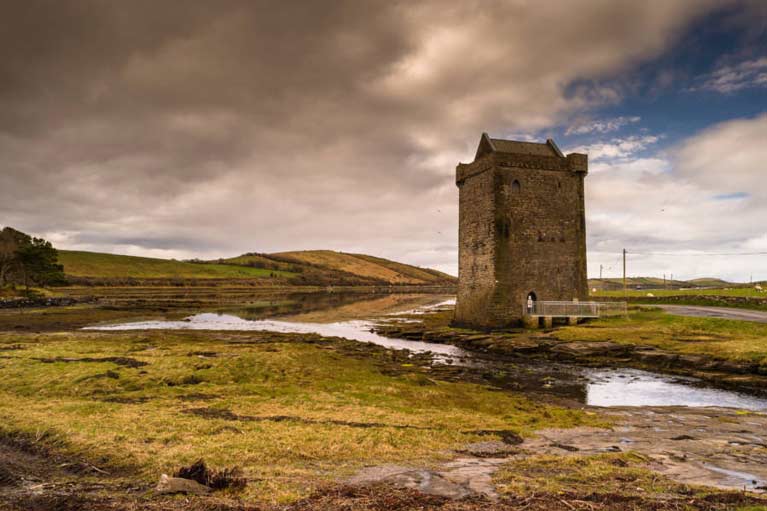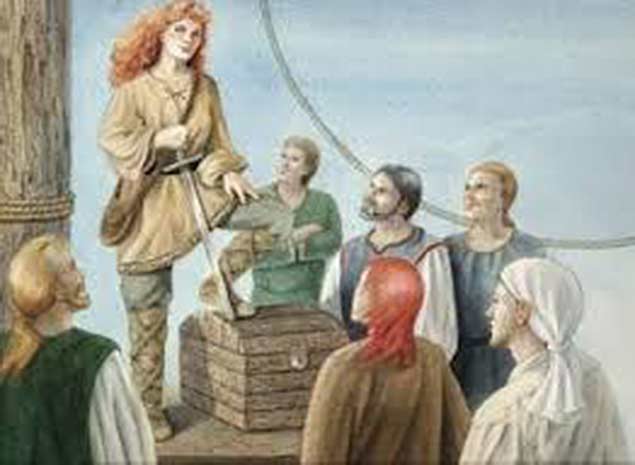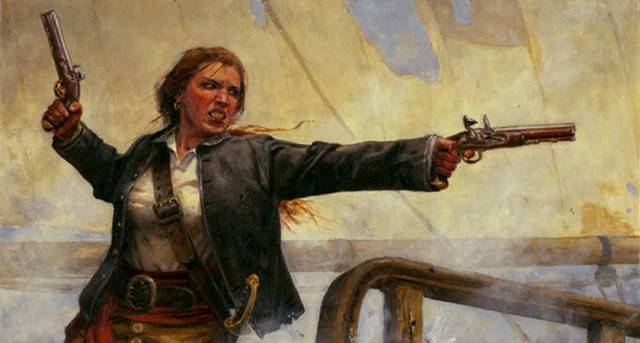When the great sea warrior queen Granuaile of Mayo voyaged from Clew Bay to parlay with the then all-powerful Queen Elizabeth I in London, there was even more to it than was hinted at by Clew Bay Figaro sailor Joan Mulloy’s recent replication of the exploit, as reported in Afloat.ie.
For Granuaile – aka Grace O’Malley - really was a total sailor who much preferred to be afloat – she always felt restless when she had to spend the night ashore in one of her many castles which dot the shores of the bay and are found on the offshore islands too, the most visible being at the harbour in Clare Island.
That she was a right battle-axe who successfully managed to treat mere men as total inferiors is undisputed. So in a face-to-face with Elizabeth, it started off by looking as though it was a case of the immovable force meeting the irresistible object, as neither could or would speak the other’s language.
But then - God bless classic European culture – they reached a compromise by conversing in Latin. And far from being the zero-sum game of negotiation which everyone seems to expect these days, it was a win-win outcome with Granuaile heading for home with agreement reached.
 Rockfeet, one of Grace O’Malley castles beside Clew Bay. She personally always preferred to be aboard ship day and night if at all possible
Rockfeet, one of Grace O’Malley castles beside Clew Bay. She personally always preferred to be aboard ship day and night if at all possible
However, the Gods decided that as everything had gone so well, it was time to take a hand with an extra test. So they made conditions so challenging after Granuaile’s galley had weathered Land’s End and tried set a course for southwest Ireland that the doughty skipper was forced to concede, and headed for southeast Ireland instead, reckoning that some direct contact with the homeland was increasingly necessary, and once in Irish waters her presence would be so respected that she could voyage in easier stages back to Mayo via the east, north and northwest coasts.
Now I know we may be compressing history a bit here, but as Mark Twain – who we seem to be quoting a lot these days – so neatly put it, never let the facts get in the way of a good story. Anyway, all went well with the re-routing until she reached Howth, and went ashore to the Baron of Howth’s then relatively new castle in expectation of traditional hospitality. Yet the gates were closed, and the Steward emerged to inform her frostily that His Lordship was not at home.
 “Be reasonable, lads – do it my way”. Grace O’Malley provides a pep talk for her all-male crew
“Be reasonable, lads – do it my way”. Grace O’Malley provides a pep talk for her all-male crew
Like all Howthmen then as now, his Lordship was probably fulfilling a dutiful support role for the wife at the 16th Century equivalent of Supervalu a Sutton Cross, a task which can easily take a couple of hours, but that’s by the way. The problem is that the Steward bluntly turned away the unaccompanied Sea Queen from the gate (let’s face it, even then she wasn’t the sort of person you saw or expected to welcome every day), and in terms of Irish hospitality, this was an unforgivable sin.
However, in storming back to her ship, Granuaile came upon young Christopher St Lawrence, eldest son of the 9th Baron of Howth, playing with his pals on the beach near the harbour. She promptly kidnapped the boy, bundled him aboard the ship, and sailed off northabout for Mayo.
From Clew Bay she sent back a message that the boy would not be returned to his parents until they agreed that the gates of Howth Castle would never again be locked against friendly visitors, and that an extra place would always be set at the dinner table every night. The two conditions have been scrupulously maintained ever since – quite spooky when there are just two or even just one for supper – and the boy was returned unharmed.
 Handy little place by the sea – Howth Castle (left) with Ireland’s Eye beyond
Handy little place by the sea – Howth Castle (left) with Ireland’s Eye beyond
While young Christopher St Lawrence may never have repeated the experience of sailing westward as round the north and northwest of Ireland as Autumn advances, this early instance of Irish sail training under a strict but enthusiastic skipper appears to have been generally beneficial. In adult life when he became the 10th Baron Howth, and while he could get into the feuds typical of the time, his charm and survival skills were such that he and his family were able to retain the Old Religion when it was definitely neither profitable nor popular to do so, and they have kept the Old Religion and their castle and its lands ever since.
That is, until now. As reported ad nauseum, after 842 years with the St Lawrence family, Howth Castle and its lands including the island of Ireland’s Eye have been sold to Tetrarch, the top end hotel people who are best known for owning and developing Mount Juliet in County Kilkenny. They certainly do things with a certain style. But nevertheless we should be told if that extra place will still be laid for dinner.






























































